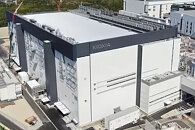Wednesday, July 27th 2022

Kioxia and WD's JV to Receive Up To 92.9 Billion Yen Government Subsidy for Yokkaichi Fab7
Kioxia Corporation and Western Digital Corporation announced today that their joint venture Fab 7 manufacturing facility at Yokkaichi Plant has been approved to receive up to 92.9 billion yen subsidy from the Japanese government. The subsidy will be granted under a designated government program aimed at facilitating corporate investment in cutting-edge semiconductor production facilities and securing stable production of semiconductors in Japan.
Leveraging their 20-year joint venture partnership, Kioxia and Western Digital will continue to accelerate the development and production of cutting-edge flash memory at the Yokkaichi Plant, the largest semiconductor plant in Japan. In addition, the two companies will contribute to the development of semiconductor-related industries and talent."We appreciate the support of the Japanese government and will continue to produce cutting-edge flash memory which is indispensable for a digital society where cloud services, 5G communications, IoT, AI and automated driving are expanding. We are committed to further advancing the semiconductor industry and contributing to the development of the domestic and global economies," said Nobuo Hayasaka, President and CEO of Kioxia.
David Goeckeler, CEO of Western Digital said "We are pleased that the Japanese government recognizes the importance of memory and data storage technologies as they remain critical innovations in the semiconductor industry. We look forward to continuing to drive long-term success together with our strategic partner, Kioxia."
With construction of the first phase of Fab 7 completed, the joint-venture manufacturing facility will enable initial production output in the fall of 2022. This facility will produce 3D flash memory including 112- and 162-layer and future nodes.
Leveraging their 20-year joint venture partnership, Kioxia and Western Digital will continue to accelerate the development and production of cutting-edge flash memory at the Yokkaichi Plant, the largest semiconductor plant in Japan. In addition, the two companies will contribute to the development of semiconductor-related industries and talent."We appreciate the support of the Japanese government and will continue to produce cutting-edge flash memory which is indispensable for a digital society where cloud services, 5G communications, IoT, AI and automated driving are expanding. We are committed to further advancing the semiconductor industry and contributing to the development of the domestic and global economies," said Nobuo Hayasaka, President and CEO of Kioxia.
David Goeckeler, CEO of Western Digital said "We are pleased that the Japanese government recognizes the importance of memory and data storage technologies as they remain critical innovations in the semiconductor industry. We look forward to continuing to drive long-term success together with our strategic partner, Kioxia."
With construction of the first phase of Fab 7 completed, the joint-venture manufacturing facility will enable initial production output in the fall of 2022. This facility will produce 3D flash memory including 112- and 162-layer and future nodes.

8 Comments on Kioxia and WD's JV to Receive Up To 92.9 Billion Yen Government Subsidy for Yokkaichi Fab7
Is there an example of a subsidy dependent company or sector that worked out in the long run?
As for other sectors ... Fossil fuels. Farming. Maybe not exactly dependent but do they object to receiving subsidies?Canon has been among the top patent holders for as long as I can remember. Well, in 2021, several Chinese companies surpassed them. Which makes me believe that lack of research isn't one of their top issues.
However, in the DSLR and compact camera industry, Canon and Nikon's DSLRs kept improving their hardware in small steps, but the hardware was already perfected too many years ago. What you say about software sure applies to their cameras too, other companies saw the opportunity to improve their cameras them with better software, Canon and Nikon didn't.
Farming is the perfect example of subsidy dependence, without it most farmers wouldn't exist.